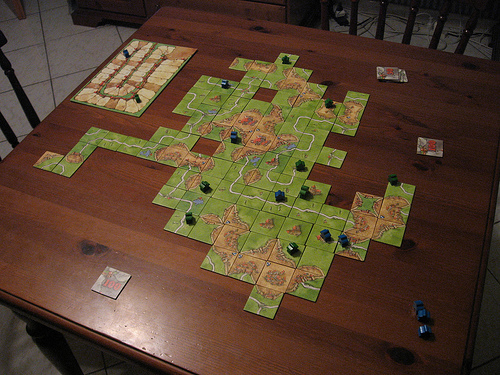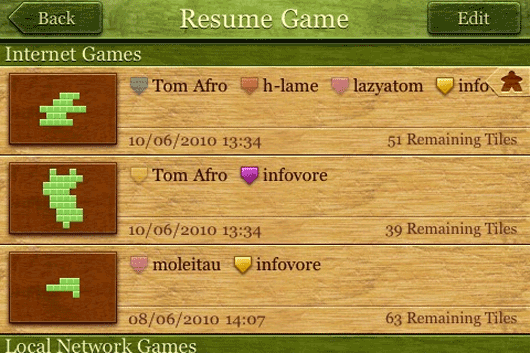-
Great piece of games journalism from Duncan Fyfe: the history and legacy of Mastermind. Wide-ranging, great bits of research. Love it.
"The earliest reference to Bulls and Cows is in the work of Dr. Frank King. In 1968, King was studying for a PhD in electrical engineering at Cambridge University and looking for something to implement on the university's Titan computer, which had recently been equipped with Multics, a time-sharing operating system allowing multiple users to access one computer concurrently and remotely.
Thinking a game would be enjoyable, and something more sophisticated than Tic-Tac-Toe even better, King wrote a version of a childhood puzzle. "Good grief, you've implemented Bulls and Cows," he remembers other students saying, though he called it MOO."
-
A bunch of Packers players are really, really into Catan. It's quite a sweet story, really.
-
"My challenge to you is as follows. Design a game which is appealing to play, which will go on to be a huge commercial success and yet illustrates through its systems the abject and total horror, the inhumanity, the alienation, the banality, the evil, and the hell-on-earth of a socio-political practise taken to extreme. The game must be named honestly. It must be easy to learn. It must be a game for all the family." As expected, this is great, but of course it is, because Martin is great. More to the point: it's shrewd and useful. (And: excellent nous from Cara to pick up this piece from someone who clearly could become a major games journalism talent. Please keep commissioning this "Martin Hollis")
-
Because one day I might go, right?
-
"The point is that this is lossless game design. There is no shark pit. When you buy a board game, what you take home and play is the original concept precisely as it was in the designer’s head. That’s the mecca for video games. For board games, it’s the norm."
-
"I don’t need some pencilneck with four Ph.D’s, one-thousand hours of simulator time, and the ability to operate a robot crane in low-Earth orbit. I need someone with four years of broad-but-humanities-focused studies, three subsequent years in temp jobs, and the ability to reason across multiple areas of study. I need someone who can read The Bell Jar and make strong observations about its representations of mental health and the repression of women. Sure, you’ve never even flown a plane before, but with only ten days until the asteroid hits, there’s no one better to nuke an asteroid."
-
"I am not naive and I am not a fool. I realize that gamification is the easy answer for deploying a perversion of games as a mod marketing miracle. I realize that using games earnestly would mean changing the very operation of most businesses. For those whose goal is to clock out at 5pm having matched the strategy and performance of your competitors, I understand that mediocrity's lips are seductive because they are willing. For the rest, those of you who would consider that games can offer something different and greater than an affirmation of existing corporate practices, the business world has another name for you: they call you "leaders."" Ian's whole article is great, and the comment thread is eye-opening.
-
"Something terrible has happened in our city (and may yet continue to happen). It's damnable, deplorable, heartbreaking. But it is also extraordinary, unusual, bizarre. Slamming the door on it without studying and understanding it is a dangerous and short-term tactic. Allowing yourself to feel nothing but anger, and doing nothing but lashing out … isn't that a little mindless? It would be nice, and useful, if we could ask London "why" without already having an answer in mind." Excellent, sober, cautious writing from Will Wiles.
-
"In this volume, people of diverse backgrounds — tabletop game designers, digital game designers, and game studies academics — talk about tabletop games, game culture, and the intersection of games with learning, theater, and other forms. Some have chosen to write about their design process, others about games they admire, others about the culture of tabletop games and their fans. The results are various and individual, but all cast some light on what is a multivarious and fascinating set of game styles."
-
Lovely little round-up of games about architecture and the urban environment from Kars.
Being With Each Other
17 July 2011
From this week’s Cardboard Children, over at Rock Paper Shotgun:
I don’t know if Subbuteo is a great game. I’m sure it is. It just wasn’t really a game to me. It was just one of many things I shared with my da. Like Star Trek and in-depth conversations about the nature of the universe. Now, as a father myself, I realise what was actually happening when we were playing that game we didn’t know the rules of. We were just being with each other. Flicking plastic. Shooting the shit. Playing.
What’s the point of all this?
Being with each other – for me, that’s the key element of board gaming. When you get that occasional person who openly tells you they see board games as “sad”, I feel a bit sad that they don’t get it. If I want to play a board game with you, it really just means I want to sit with you a while. That’s not a bad thing, is it?
No, Rab, that’s not a bad thing at all. And this is why some of my favourite boardgame memories are from afternoons and evenings sat in pubs around the country, rattling through game after game of Lost Cities, or Blue Moon, sat by a welcoming fire or bright window, pints in hand. It’s just a way to spend some time with a friend.
-
"In Space Alert you and your friends make up the intrepid (doomed) crew of a Sitting Duck class exploration vessel. The way these ships work is that they’ll jump into a comedically hostile sector of space, spend 10 minutes scanning their surroundings, and then automatically jump you back out again. A game of Space Alert only ever lasts 10 real-life minutes, and during that time it’s the job of the players to listen to the ship’s hateful computer (a CD which comes bundled with the game) as it reels off what threats are approaching and from where, and then prevent these threats from destroying you in an orderly and professional manner. Surviving isn’t necessarily that hard, but the professionalism part? Impossible." Space Alert is brilliant. Even if most of our missions involved us falling over a lot, because we forgot about the screensaver. Quintin summarises it nicely.
-
So, I began nodding my head a tad, but then halfway through it became clear that this is born out of a somewhat large chip on a shoulder, and that chip is primarily about "social games" (as they are commonly described), and that really, I don't agree with much of this. The "you" in question is quite narrow, and cheap shots like the notion that the title 'games consultant' has "an inherent tragic quality" don't help. Experienced, outside eyes often make things better. Does that mean there's going to be a cavalcade of barely-qualified games consultants in the impending gameificationpocalypse? Of course. Does that mean McCrae's point is true? Not really. Obvious disclaimer: I know several games consultants. They are all very good at what they do. They also bear no resemblance to what McCrae describes.
-
"This is what the next generation of the mega-selling phone will look like. They'll be rough facsimiles of the high-end smartphones forged for well-heeled buyers, stripped of fat and excess—an embodiment of compromise. They'll be 90% of the phone for 20% of the price, with FM radios instead of digital music stores, and flashlights instead of LED flashes. This is how the other half will smartphone, if you want to be so generous as to call the developing world's users a half. We're not even close." Yes.
-
"Sahel Sounds rounded up music salvaged from the discarded mobile phone memory chips in West Africa." Wow; the after-life of dead electronic media made real.
-
"Board games are different. Sure, while you might love a board game for the sense of immersion it provides, or the way the game lifts off the table and fills the room, you also might love it for how beautiful the mechanics are. It’s like looking inside a clockwork watch. That fascination, as you see how all the pieces fit together, how everything is timed to perfection, how balanced it all is. With a beautiful board game design, you can love it for that craftsmanship you can feel with every turn." Yup. But, of course: this is, increasingly, why I like any game. It's just much more visible in boardgames – where you have to wrangle the rules yourself. And everything else – the immersion, the involvement – will come too; it just comes from that clockwork heart.
Carcassonne: Making Pretty Shapes
18 June 2010
I really like Carcassonne.
I like it because it’s as interesting with two players as with four – just a very different game in each case. I like it because of the various scoring methods it combines: simple play-piece/gain score for roads/abbeys/towns; longer-term risks with potentially higher rewards for farmers. I like that it forces you to juggle a limited number of scoring opportunities.
But I like it best because it’s about making pretty landscapes.

photograph: “Carcassonne: Inns & Cathedrals” by SimDawdler
When The Coding Monkeys (who, a good while ago, wrote the excellent SubEthaEdit), released their iPhone version of Carcassonne, I had to check it out. After all, if they can make a multiplayer text editor as good as SubEthaEdit, they might well be an ideal fit for an asynchronous, multiplayer boardgame.
Turned out I was right: they’ve really put some time and thought into their iP:hone version. The UI is lovely, as simple as possible, but rich where it needs to be: it’s very clear what’s going on and what the options available to you are. There’s also a nice focus on playing asynchronously – multiple games, taking turns as and when – which is only enhanced by the “next table” button that lets you ripple through open games without constantly returning to a menu.
But best of all is this screen:

The tile-layouts of each game are the thumbnail used to represent them.
As the games go on, this screen updates, their icons evolving from single green dots to sprawling landscapes. Of course the layout is the element of the game you place front and centre when it comes to navigation; it’s the most iconic part of any single game, and it works as a lovely aid to recognition.
Nicely done.
-
Ooh. Turned-based multiplayer, from the looks of things, which would be ideal for a nice, long, slow, PBM-style game.